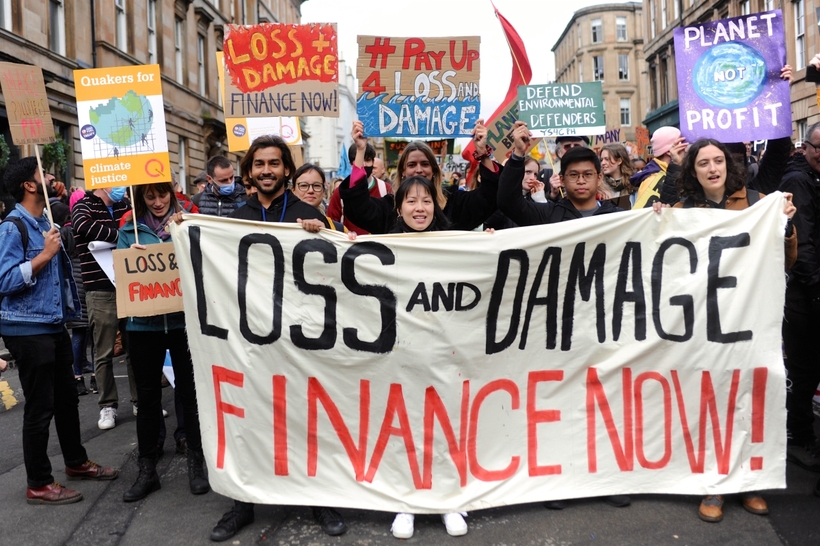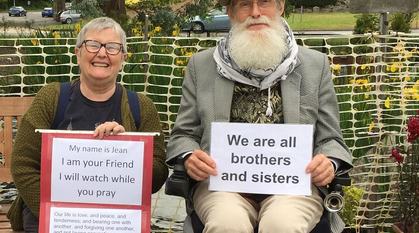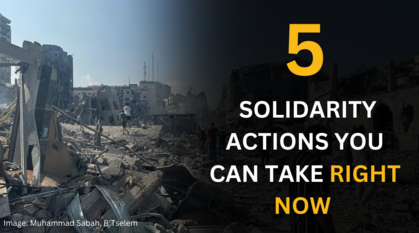What next for loss and damage at COP28?
The COP28 climate talks start on Thursday 30 November. Rebecca WalkerWoo looks at progress on the loss and damage fund since COP27 and why we need to keep the pressure up.

As we go into COP28, it's important to remember the unthinkable can happen when we stand together and apply pressure.
What happened at COP27?
Take for example, this time last year, when something unexpected happened at COP27. Governments around the world agreed to set up a Loss and Damage Fund under the UN Framework Convention for Climate Change (UNFCCC). The fund is supposed to provide financial assistance to developing and climate vulnerable countries, to help them respond to some of the worst impacts of climate change.
This decision was the result of decades of calls from Global South countries and tireless campaigning by many climate justice movements, including the UK's, in recent years. But it was unexpected because loss and damage finance cuts to the heart of a deeply political issue: wealthy nations and polluters accepting responsibility for the harm their carbon emissions have caused and then paying to redress that harm.
Agreeing to establish a Loss and Damage Fund was step one for the international community. But there is still a long way to go before loss and damage financing finally flows to communities around the world most in need of support. At COP28, we need to ensure money is finally put into the 'empty bucket' of the Loss and Damage Fund.
What progress has there been on filling the bucket?
At COP27, parties to the UNFCCC set up a Transitional Committee (TC) to work out how to get a loss and damage fund up and running. Their agenda included looking at how the fund would work (who would get funding and on what basis), as well as looking at where funding might come from. The committee is made up of representatives from around the world (including the UK).
Over the last year, the TC has held five meetings, two workshops, a dialogue, and a ministerial meeting. At their final meeting, they agreed a set of recommendations that are now being forwarded to COP28. However, these recommendations have been widely criticised for a number of reasons:
- The TC has recommended that contributions into the Loss and Damage Fund are voluntary. Instead of enforcing a polluter pays principle, developed countries are “urged" and “invited" to provide funding.
- The TC has recommended that the World Bank should be the interim host of the Loss and Damage Fund for the next four years. Global South communities are deeply unhappy about this decision because the World Bank's policies and business model (offering loans, not grants) ensure many countries across the Global South are trapped in cycles of debt. The bank has also helped cause the climate crisis, for example it spent billions of dollars backing fossil fuels last year.
- The TC has made little progress identifying new funding sources. But we know from our Make Polluters Pay campaign, the answer doesn't need to be complicated – if you pollute, you pay for loss and damage. Here are some ideas from our coalition partner Oxfam GB.
- The TC recommendations still leave a number of gaps around who would be eligible for funding and how countries in need would be able to access support.
Commentators have reflected the TC was given an immensely difficult task, but at the very least they agreed some recommendations. Now the buck passes to us, to make sure that discussions at COP28 address the problems with and gaps in the TC recommendations.
How can we help keep up the pressure during COP28?
As Paul Parker outlined in this blog last year, COPs may be flawed processes, but they are “our annual opportunity to hold our governments to account, to scrutinise their promises and highlight the gaps between pledge and performance."
We need to keep raising our voices: it is long overdue for countries like the UK to recognise our historical contribution to climate breakdown and to put money into the Loss and Damage Fund. COP28 will be a crucial moment for this. Here in the UK there are key actions we can point to: Scotland's status and practical action as the first government to put aside funding for loss and damage, and the EU's announcement it will put money into the Loss & Damage Fund at COP28.
Loss and Damage themed day, 6 December 2023
On Wednesday 6 December, there will be a moment for us to cut through the many discussions at COP28 with a themed day on health/relief, recovery and peace, including loss and damage. Use our Make Polluters Pay tool to write to your MP and follow us on social media (Twitter; Instagram) to find out about other planned actions during COP28.
Global Day of Action, 9 December 2023
On Saturday 9 December, there will be a Global Day of Action. It will be a vital moment to build the strength of our movement across Britain and the globe. Find an action near you and email climatejustice@quaker.org.uk for support and to connect with other Quakers taking action.


